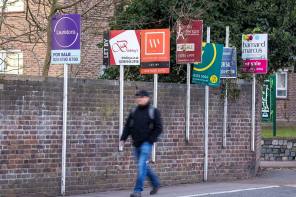

Experts have raised fears that tax relief changes may cause the next property crash.
Provider of audit, tax and consulting services RSM has argued tax changes facing landlords will force many to put rents up in order to cover their shortfall, which will increase the cost of renting for many tenants.
Landlords can deduct mortgage interest and other finance-related costs from their rental income before calculating their tax liability. But this interest relief is being cut and then scrapped.
Prior to April, landlords could claim 100 per cent interest relief. But by April 2020 this will fall to zero.
Instead the income tax on someone’s property profits and any other income sources will be calculated and they will then be granted a tax credit worth 20 per cent of the mortgage interest cost to offset against income tax.
The result will be that the amount of tax owed by some landlords will double or even triple.
Currently just 25 per cent of a landlords’ interest costs gets tax relief at the basic rate of 20 per cent.
In the next tax year that will be 50 per cent and by 2020 to 2021 all interest costs will only get tax relief at the basic rate.
Gary Heynes, head of private client at RSM, said: “Higher interest rates coupled with rent controls would not be a great environment for personal landlords and could instigate ‘the great sell-off’ as landlords look to reinvest elsewhere.
“This response could cause the next property crash as the property market becomes oversupplied with assets to sell, pulling house prices down, impacting equity levels and mortgage agreements.
“So now is the time for landlords to look at their options and act quickly to mitigate any future risks.”
The changes mean that someone with a £600,000 property, often gets a net yield of just under 3 per cent at around £17,700 a year.
With a mortgage at 60 per cent loan-to-value and 4 per cent interest, they currently pay out £14,400 in interest costs.
This means they are currently making a net taxable profit of £3,300.
If paying tax at the top rate of 45 per cent, their tax bill is £1,485.
Next year, their tax bill will be just under £3,300, which is all the profit they currently make.
In the year after, it will be £4,185 and just over £5,000 thereafter, meaning it will cost them £1,700 a year to run their rental business in the future.
These figures are for an interest-only mortgage, but the actual cost is set to be even greater as most landlords will have a part-repayment mortgage.
Martin Bamford, chartered financial planner at Surrey-based Informed Choice, said he has several clients who are landlords and the government’s attack on their tax relief has been a bone of contention since it was first announced.
He added that although it is unlikely to trigger a widespread property crash, it has caused some landlords to sell up because they can no longer make the figures stack up.
He said: “Rather than cause property prices to crash, the tax changes and introduction of higher stamp duty have already removed a pool of potential buyers from the market and caused a stagnation of some local property markets.
“I believe that tenants will also face rent hikes as landlords seek to maintain their net profit margins.
“The tax changes are a useful reminder that legislation can and does change. No investor should rely on the current tax position of an investment to continue forever.
“Property can be a challenging asset class because it is relatively illiquid and involves leverage through mortgage debt.
“Unwinding an investment in a portfolio of residential properties is usually time consuming and costly, so investors need to look for fat margins and take the long view in order to avoid the need to sell up when the tax goalposts are moved.”



